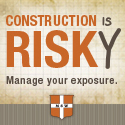
| www.agc.org • May 2016 |
Contact Us Archives
Subscribe Printer-Friendly AdvertiseSafety and HealthFacebook |
Safe and Sound HOW CULTURE, COMMITMENT AND CARE LED SUNDT TO THE CONSTRUCTION SAFETY EXCELLENCE AWARD WINNER’S CIRCLE
BY AMY DREW THOMPSON
If the first rule of Fight Club is "Don’t talk about Fight Club," the opposite is true of any construction company’s safety program. Talking about it, every single day, says Tom Case, is a core requirement for success.
"It sounds cliché," says Case, who is the chief operating officer for Sundt Construction, a member of multiple AGC chapters, "but it starts with people — caring about people and making them feel important. We have what’s called ‘Safety by Choice.’ Do it for yourself. Do if for your co-worker. Do it for your family. And it really is about making choices and caring about one another. And I think that’s a cultural thing."
For Sundt, recently named the nation’s safest construction company at the Willis Towers Watson Construction Safety Excellence Awards (CSEA) at AGC of America’s 97th Annual Convention in San Antonio, the culture apparently runs deep. The grand award was one of two the company walked away with in March — taking first place in the Highway Division among contractors with more than a million man-hours. Chosen by a panel of five independent safety professionals from the government, corporate and insurance industries, the CSEA winners are examples to be followed.
"The [application] process is pretty thorough and comprehensive ... very well thought out," says Case. "It allows contractors to benchmark against their peers and determine where they stand. It requires you to communicate the ideals of your safety program — how you identify hazards, how you mitigate risks, how you equip people with the tools they need to be safe and successful in the work they do. I would encourage anyone and everyone who’s in the industry to go through it.
"The first reason to do it is it makes us better."
 (l-r) Chuck Greco, 2015 AGC president; Sundt team members Mark Bakeman, Marco Orona, Tom Case, Paul Sprecco, Paul Levin, Travis McCarthy, Mike Hoover, and Jeff Williamson; and Mike Fredebeil, Willis Towers Watson. CONSTANT CHANGE
And becoming better, says Paul Levin, Sundt’s director of safety and quality, means implementing an ever-evolving program. "That includes everybody in the whole organization being committed not only to working safely, but trying to improve safety every day."
Sundt’s program, he says, enjoys the highest level of support from its leaders. "It takes day-to-day, hour-to-hour, minute-to-minute commitment in trying to plan your work ... in asking, ‘What is the worst thing that can happen? How can we do this safer?’ And ultimately, you have to ask for input from the people who are doing the work."
In fact, they are so committed to asking, they recently put the whole process in writing with something called the Climate Survey on Safety.
"It’s pretty exciting!" says Case. "We actually survey the workforce [throughout] the work — prior to, during and then at its completion. We ask 10 or 12 questions related to safety — the same questions we ask everybody on every job."
Anonymity, he adds, is an essential factor in the poll, allowing workers to be completely honest and forthright.
"What that does is allow us into the hearts and minds of our workforce." So, too, it gives them real data points by which to understand the mindset of the men and women who show up ready to go each morning.
"Those answers become part of the things we talk about in safety meetings," Case notes. "[The information is] real and tangible and important, but also gets into some of their values and beliefs — some of what makes them tick. And if they’ll share that, you can build a lot more engagement ...," he pauses thoughtfully before adding, "... and loyalty."
Letting employees — and in the case of Sundt, employee-owners, as each one owns a piece of the company — know their company cares enough to ask how they feel, "as opposed to what they’re going to do, how many widgets they’re going to make," Case notes, goes a long way in fostering a culture where people feel comfortable going to a supervisor with a potential safety issue.
SPEAK UP! LISTEN UP!
Long employed by the professionals at Caterpillar in training its own employees, Speak Up! Listen Up! has since been adapted into the culture at Sundt for its own workers.
It’s been in place for a little more than a year. "It allows for safety timeouts," Levin explains. "If something doesn’t feel right, the employee is encouraged to say something; his supervisors [are] encouraged to listen."
This can be intimidating for an employee, yes?
"Very much so!" Case says emphatically, launching into a bit of role play. "I’m a laborer, right? Maybe I’ve only been with the company a week or a day and you’re the president. Can I approach you and call a safety timeout? And the notion is: yes.
Anybody at any level of the organization, with any amount of tenure, can and should feel empowered to stop any activity if they feel that an unsafe condition exists."
It’s a written principle in the safety program. But it’s easier said than done. "You have to encourage employees who think they can’t stop production and say, ‘Well, no. You can.’ And once you allow that to start, it becomes empowering and your workforce feels more engaged and a part of something, rather than just being there to do a task."
And in fact, it has worked. Employees have used their new-found power.
"And we’re rewarding them," says Case. Rather than calling them out for stopping production, Sundt looks to thank them for their commitment to everyone’s safety. It drives accountability, Case notes. And follow-through. "If we don’t, workers will say, ‘Well, we brought it up and you didn’t do anything about it.’ And they’d be right."
COMMITMENT THAT’S CONSISTENT
Living the values — creating the culture, nurturing it, following through on employee concerns — is how they forge the commitment, says Case. "We are a diverse company that does a lot of different kinds of work — vertical and horizontal and industrial construction. It’s a wonderful company with strong values and traditions."
Case believes that winning the safety award — and not for the first time; Sundt took it home in 2006 as well — is emblematic thereof.
"We have policies, but they have to be more than words on a page. More than lip service," he says. "We live these values every day — and the ‘we’ is collective.
It’s all of us as individuals. Five of us participated in the interview for the CSEA award. All of us are committed to the same thing, which is getting everybody home at night, making sure we take care of each other and ourselves. But Sundt is very large: 1,400 employees each of whom owns a piece of the company, and all of them truly care about one another.
It’s kind of like having a family. It’s not enough to be committed. You have to make good on your commitments."
How do they foster such a safety culture in a company that’s more than a thousand strong?
"You can’t do it all at once," says Case. "It’s just one day at a time, one employee-owner at a time. ... And I’m thrilled to be part of a great organization that cares as much about its people as it does about its clients."
The timing of the Harness Hero declaration by City Councilman Daniel Gilman is perfect in that we are currently in the midst of OSHA’s National Stand-Down to Prevent Falls in Construction Week. The purpose of the May 2-6 Stand-Down Week is to raise awareness of preventing fall hazards in construction.
"The City of Pittsburgh has built a reputation for forging strong partnerships across all sectors, and the launch of Harness Hero exemplifies the power of collaboration between the business community and the City’s booming technology sector to keep employees safe," said Councilman Gilman.
"It’s exciting to see the construction industry benefiting from our region’s strong technology sector to create a safety training app that can save lives," said Jack Ramage, Executive Director for the Master Builders’ Association. "Pittsburgh has always been a pioneer when it comes to construction safety and now we’re utilizing advancements in technology to train professionals to be safer on the jobsite."
|
|||
 2300 Wilson Boulevard, Suite 300 · Arlington, VA 22201 · 703-548-3118 (phone) · 703-548-3119 (fax) · www.agc.org
2300 Wilson Boulevard, Suite 300 · Arlington, VA 22201 · 703-548-3118 (phone) · 703-548-3119 (fax) · www.agc.org
About AGC | Advocacy | Industry Topics | Programs and Events | Career Development | News & Media
© Copyright 2025 The Associated General Contractors of America. All rights reserved.

